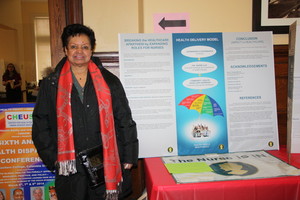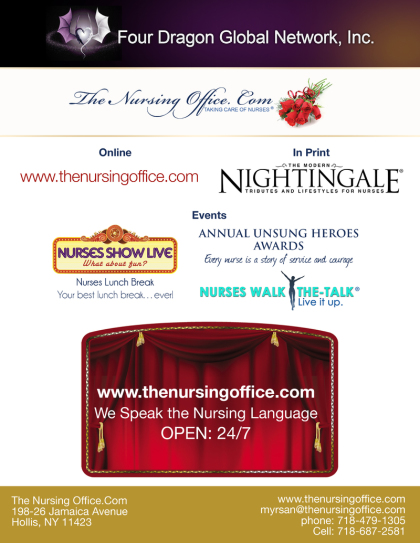Transforming Healthcare Through Nursing Leadership
NURSING SERVICES
ADVOCACY for NURSES,TAKING CARE of NURSES
Our Advocacy Programs for Nurses work on one bottom line principle that Nurses are Human and are not exempt from life adversaries, and other situations characteristic of a human being in a social setting.
Visions:
Nurse Driven Healthcare Solutions
Mission:
To influence the future of nurses and Nursing.
To influence the future of healthcare.
Philosophy:
I appreciate the dedication, passion and service of every nurse. I recognize their contribution to the global healthcare. I believe and support the individual and group efforts of nurses towards holistic life. I value all nurses and recognize the need to meet their basic needs: physical, spiritual, mental, social and financial so they can be freed of burden to unselfishly give service to the community.
I respect man’s dignity and autonomy toward the right to self-direction and self-preservation.
RN CAREER LINKS
BACKGROUND: EMPOWERING NURSES
The RWJF Initiative on the Future of Nursing at IOM
The Future of Nursing
Leading Change, Advancing Health
OCTOBER 2010
With more than 3 million members, the nursing profession is the largest segment of the nation’s health care workforce. Working on the front lines of patient care, nurses can play a vital role in helping realize the objectives set forth in the 2010 Affordable Care Act, legislation that represents the broadest health care overhaul since the 1965 creation of the Medicare and Medicaid programs. A number of barriers prevent nurses from being able to respond effectively to rapidly changing health care settings and an evolving health care system. These barriers need to be overcome to ensure that nurses are well-positioned to lead change and advance health.
In 2008, The Robert Wood Johnson Foundation (RWJF) and the Institute of Medicine (IOM) launched a two-year initiative to respond to the need to assess and transform the nursing profession. The IOM appointed the Committee on the RWJF Initiative on the Future of Nursing, at the IOM, with the purpose of producing a report that would make recommendations for an action-oriented blueprint for the future of nursing.
Nurses practice in many settings, including hospitals, schools, homes, retail health clinics, long-term care facilities, battlefields, and community and public health centers. They have varying levels of education and competencies—from licensed practical nurses, who greatly contribute to direct patient care in nursing homes, to nurse scientists, who research and evaluate more effective ways of caring for patients and promoting health. The committee considered nurses across roles, settings, and education levels in its effort to envision the future of the profession. Through its deliberations, the committee developed four key messages that structure the recommendations presented in this report:
A number of barriers prevent nurses from being able to respond effectively to rapidly changing health care settings and an evolving health care system. These barriers need to be overcome to ensure that nurses are well-positioned to lead change and advance health.
1) Nurses should practice to the full extent of their education and training. While most nurses are registered nurses (RNs), more than a quarter million nurses are advanced practice registered nurses (APRNs), who have masters or doctoral degrees and pass national certification exams. Nurse practitioners, clinical nurse specialists, nurse anesthetists, and nurse midwives all are licensed as APRNs.
Because licensing and practice rules vary across states, the regulations regarding scope-of-practice—which defines the activities that a qualified nurse may perform—have varying effects on different types of nurses in different parts of the country. For example, while some states have regulations that allow nurse practitioners to see patients and prescribe medications without a physician’s supervision, a majority of states do not. Consequently, the tasks nurse practitioners are allowed to perform are determined not by their education and training but by the unique state laws under which they work.
The report offers recommendations for a variety of stakeholders—from state legislators to the Centers for Medicare & Medicaid Services to the Congress—to ensure that nurses can practice to the full extent of their education and training. The federal government is particularly well suited to promote reform of states’ scope-of-practice laws by sharing and providing incentives for the adoption of best practices. One sub-recommendation is directed to the Federal Trade Commission, which has long targeted anti-competitive conduct in the health care market, including restrictions on the business practices of health care providers, as well as policies that could act as a barrier to entry for new competitors in the market.
High turnover rates among new nurses underscore the importance of transition-to-practice residency programs, which help manage the transition from nursing school to practice and help new graduates further develop the skills needed to deliver safe, quality care. While nurse residency programs sometimes are supported in hospitals and large health systems, they focus primarily on acute care. However, residency programs need to be developed and evaluated in community settings.
2) Nurses should achieve higher levels of education and training through an improved education system that promotes seamless academic progression. To ensure the delivery of safe, patient-centered care across settings, the nursing education system must be improved. Patient needs have become more complicated, and nurses need to attain requisite competencies to deliver high-quality care. These competencies include leadership, health policy, system improvement, research and evidence-based practice, and teamwork and collaboration, as well as competency in specific content areas including community and public health and geriatrics. Nurses also are being called upon to fill expanding roles and to master technological tools and information management systems while collaborating and coordinating care across teams of health professionals.
Nurses must achieve higher levels of education and training to respond to these increasing demands. Education should include opportunities for seamless transition into higher degree programs—from licensed practical nurse (LPN)/licensed vocational nurse (LVN) diplomas; to the associate’s (ADN) and bachelor’s (BSN) degrees; to master’s, PhD, and doctor of nursing practice (DNP) degrees. Nurses also should be educated with physicians and other health professionals both as students and throughout their careers in lifelong learning opportunities. And to improve the quality of patient care, a greater emphasis must be placed on making the nursing workforce more diverse, particularly in the areas of gender and race/ethnicity.
3)Nurses should be full partners, with physicians and other health care professionals, in redesigning health care in the United States.
Efforts to cultivate and promote leaders within the nursing profession—from the front lines of care to the boardroom—will prepare nurses with the skills needed to help improve health care and advance their profession. As leaders, nurses must act as full partners in redesign efforts, be accountable for their own contributions to delivering high-quality care, and work collaboratively with leaders from other health professions.
Being a full partner involves taking responsibility for identifying problems and areas of system waste, devising and implementing improvement plans, tracking improvement over time, and making necessary adjustments to realize established goals. In the health policy arena, nurses should participate in, and sometimes lead, decision making and be engaged in health care reform-related implementation efforts. Nurses also should serve actively on advisory boards on which policy decisions are made to advance health systems and improve patient care.
In order to ensure that nurses are ready to assume leadership roles, nursing education programs need to embed leadership-related competencies throughout. In addition, leadership development and mentoring programs need to be made available for nurses at all levels, and a culture that promotes and values leadership needs to be fostered. All nurses must take responsibility for their personal and professional growth by developing leadership competencies and exercising these competencies across all care settings.
4) Effective workforce planning and policy making require better data collection and an improved information infrastructure.
Planning for fundamental, wide-ranging changes in the education and deployment of the nursing workforce will require comprehensive data on the numbers and types of health professionals—including nurses—currently available and required to meet future needs. Once an improved infrastructure for collecting and analyzing workforce data is in place, systematic assessment, and projection of workforce requirements by role, skill mix, region, and demographics will be needed to inform changes in nursing practice and education.
The 2010 Affordable Care Act mandates the creation of both a National Health Care Workforce Commission to help gauge the demand for health care workers and a National Center for Workforce Analysis to support workforce data collection and analysis. These programs should place a priority on systematic monitoring of the supply of health care workers across professions, review of the data and methods needed to develop.
To ensure the delivery of safe, patient-centered care across settings, the nursing education system must be improved. Patient needs have become more complicated, and nurses need to attain requisite competencies to deliver high-quality care.
Conclusion
The United States has the opportunity to transform its health care system, and nurses can and should play a fundamental role in this transformation. However, the power to improve the current regulatory, business, and organizational conditions does not rest solely with nurses; government, businesses, health care organizations, professional associations, and the insurance industry all must play a role.
The recommendations presented in this report are directed to individual policy makers; national, state, and local government leaders; payers; and health care researchers, executives, and professionals—including nurses and others—as well as to larger groups such as licensing bodies, educational institutions, philanthropic organizations, and consumer advocacy organizations. Working together, these many diverse parties can help ensure that the health care system provides seamless, affordable, quality care that is accessible to all and leads to improved health.
~Institute of Medicine
The FUTURE of NURSES: Nurses lead change and advance health
As the biggest workforce in healthcare and the most trusted to care in the community, hospitals celebrate their nurses on Nurses Week, every second week of May.
While nurses felt their appreciation on these special days, there are comments and buzz in the air: “We need more than these mugs and cakes, water bottles and pens…” Nurses are very simple people and easy to please, just give them these gifts and they will be alright.
Yet, nurses are the most valuable part and asset of healthcare, serving 24/7, 365 days a year. They are professionals, trained for the highest level of care, they deliver their excellence in clinical practice, they are tired, and they need to be conserved as dear as endangered species.
Hospitals should change their culture in the way they look at nurses. They should take care of their nurses 24/7, 365 days a year. If they will only think of ways to lead change and improve healthcare and get the most from the nurses’ full extent of training and education.
And this is how hospitals should appreciate and celebrate nurses: promotion to the next level of practice as Clinicians. Let nurses lead change and advance health. This is the future of nursing.
~MDS
The FUTURE of HEALTHCARE: Why more nurses are needed in the boardroom
The health care system is changing rapidly, and both providers and patients would benefit from having more nurses making policy as part of the boards of health systems, write Susan B. Hassmiller, director of the Future of Nursing: Campaign for Action, and Susan Reinhard, chief strategist for the AARP's Center to Champion Nursing in America. Nurses make up the largest segment of health care workforce but hold just 6% of hospital board seats. "Nurses already play a huge role on the frontlines. It's time they begin playing a role in the boardroom too, bringing both their practical sensibilities and view of patient care experiences to the table," they write.
By SUSAN B. HASSMILLER AND SUSAN REINHARD
Tribune News Service December 18, 2014
Nurses are Leaders Everyday
In today’s state of nursing shortage, it is beyond every nurse’s hand and shoulders to meet the needs of the public. There will always be a shortage and the only way we can take care of the people is through effective leadership. How can nurses possibly take care of the community? As the health of the world is in nurses’ hands, we have to do more than the physical caring of the acutely ill. We are the team coach for health maintenance. We teach them, we mobilize them to take care of themselves. We teach them by the principle that nursing is based on a self-help and self-preservation theory. Nobody will survive but the fittest, outsmarting the circumstances and his environment.
Whether you are in the acute care setting or in the arena of public health, the principles are the same, and the long term goal is the same: to keep everybody alive and healthy functioning human being. While that is a difficult task, you are the leader every day and that is your challenge.
Ingredients of Success as a Leader:
- Commitment
- Truth
- Excellence
- Mental Toughness
- Discipline
- Habit
- Results
- Passion
- Heart and Caring
Do you have it in you? ~MDS
RN Career Link

















































